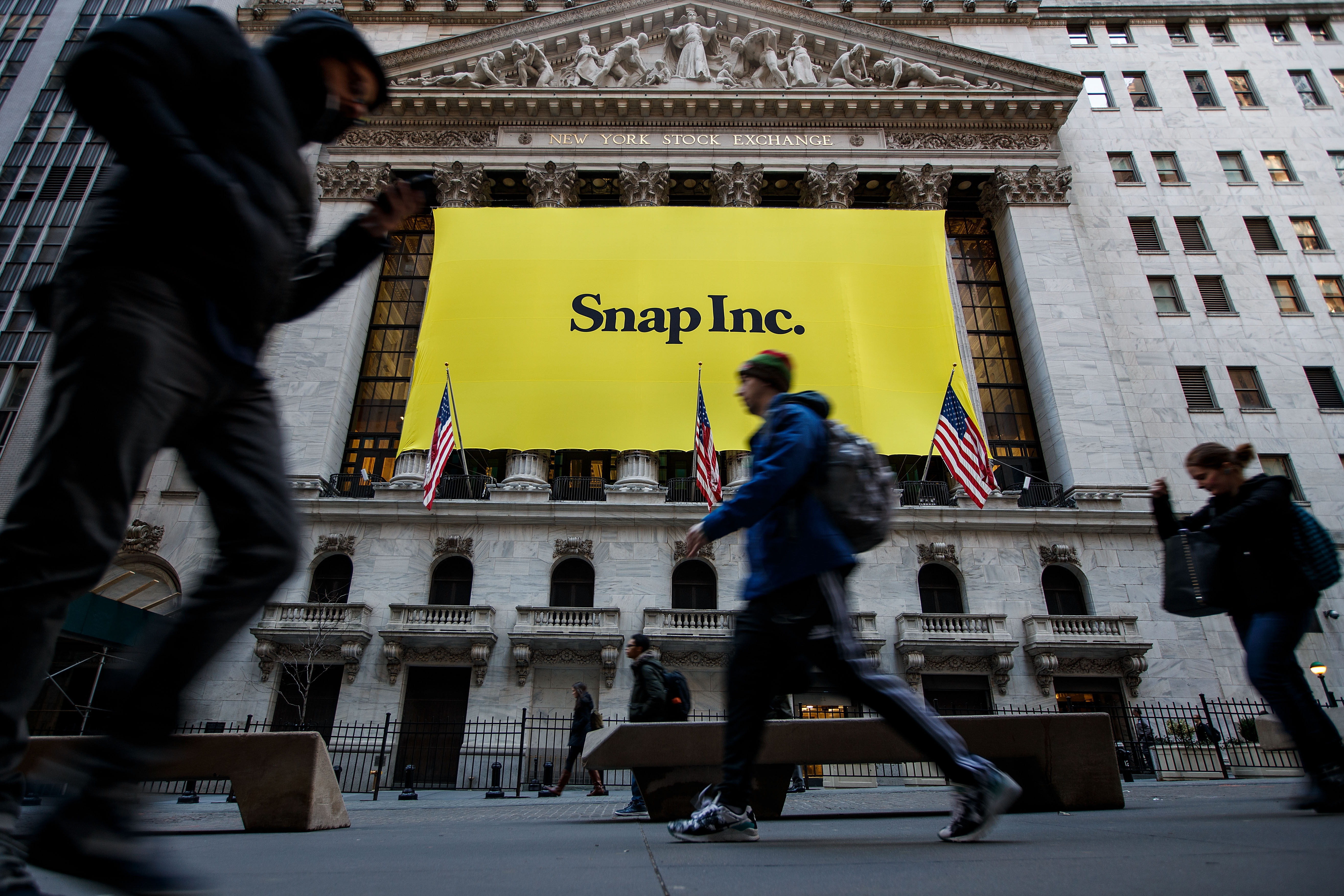Skepticism over Snapchat
How can a money-losing app be worth tens of billions of dollars?

A free daily email with the biggest news stories of the day – and the best features from TheWeek.com
You are now subscribed
Your newsletter sign-up was successful
The smartest insight and analysis, from all perspectives, rounded up from around the web:
How could a money-losing app be worth tens of billions of dollars? asked James Stewart at The New York Times. Stock in Snapchat's parent company, Snap Inc., closed 44 percent up on its first day of trading on Wall Street last week and rose another 20 percent the next day. Snap was briefly worth more than $40 billion — more than CBS, Delta, or Allstate. Those are eye-popping numbers for an app that lets you "send nude photos of yourself that self-destruct" and offers camera filters that "turn your head into a taco." But it's even more remarkable considering the company has lost money every year since it was founded in 2011, including $514.6 million in 2016, and has explicitly warned investors "it may never earn a profit." Snap shares have fallen back to Earth a bit since last week, said Nina Agrawal at the Los Angeles Times. But despite investors' growing doubts, the company's stock is still trading "well above what several Wall Street analysts believe Snap shares are worth."
"There's actually good reason to be bullish about Snap's future," said Timothy Lee at Vox. Pessimists point out that Snapchat has about 158 million daily active users compared with 1.23 billion for Facebook. The app's growth has also slowed recently, leading to fears it might become the next Twitter, a major Wall Street disappointment. But Snapchat has a secret weapon: young people. The app is more popular among Americans ages 18 to 29 than either Twitter or Facebook-owned Instagram. Advertisers are "particularly eager" to reach these consumers, who are developing brand loyalties that will last the rest of their lives. Snap's "cool" factor could just as easily backfire, said Davey Alba at Wired. Investors will expect to see massive growth. But cool "means your parents never get on Snap. And that means Snap never gets to add them to the number of users on its platform." To succeed, Snap will have to prove that its smaller, more connected audience is more valuable to advertisers than simply a large one.
The Week
Escape your echo chamber. Get the facts behind the news, plus analysis from multiple perspectives.

Sign up for The Week's Free Newsletters
From our morning news briefing to a weekly Good News Newsletter, get the best of The Week delivered directly to your inbox.
From our morning news briefing to a weekly Good News Newsletter, get the best of The Week delivered directly to your inbox.
Despite those troubles, Silicon Valley is thrilled to see one of its vaunted "unicorns" go public, said Om Malik at New Yorker. Unicorns are tech startups valued at $1 billion or more. But where the unicorn label once signified rareness, "now it is a kind of yardstick for measuring ego." Today, there are nearly 200 startups valued at $1 billion or more, but they are likelier to go belly-up than to become the next Facebook. The flash-sales startup Gilt Groupe, for example, was valued at a billion dollars in 2011 but was acquired earlier this year for only a quarter of that. Investors hope that Snap's initial public offering will trigger a fresh wave of technology IPOs after a relatively light 2016, possibly including Uber, Airbnb, and Dropbox. "But the real renaissance won't come about until investors can learn to evaluate companies on the basis of their business prospects rather than their cachet."
A free daily email with the biggest news stories of the day – and the best features from TheWeek.com
-
 Quiz of The Week: 14 – 20 February
Quiz of The Week: 14 – 20 FebruaryQuiz Have you been paying attention to The Week’s news?
-
 The Week Unwrapped: Do the Freemasons have too much sway in the police force?
The Week Unwrapped: Do the Freemasons have too much sway in the police force?Podcast Plus, what does the growing popularity of prediction markets mean for the future? And why are UK film and TV workers struggling?
-
 Properties of the week: pretty thatched cottages
Properties of the week: pretty thatched cottagesThe Week Recommends Featuring homes in West Sussex, Dorset and Suffolk
-
 The pros and cons of noncompete agreements
The pros and cons of noncompete agreementsThe Explainer The FTC wants to ban companies from binding their employees with noncompete agreements. Who would this benefit, and who would it hurt?
-
 What experts are saying about the economy's surprise contraction
What experts are saying about the economy's surprise contractionThe Explainer The sharpest opinions on the debate from around the web
-
 The death of cities was greatly exaggerated
The death of cities was greatly exaggeratedThe Explainer Why the pandemic predictions about urban flight were wrong
-
 The housing crisis is here
The housing crisis is hereThe Explainer As the pandemic takes its toll, renters face eviction even as buyers are bidding higher
-
 How to be an ally to marginalized coworkers
How to be an ally to marginalized coworkersThe Explainer Show up for your colleagues by showing that you see them and their struggles
-
 What the stock market knows
What the stock market knowsThe Explainer Publicly traded companies are going to wallop small businesses
-
 Can the government save small businesses?
Can the government save small businesses?The Explainer Many are fighting for a fair share of the coronavirus rescue package
-
 How the oil crash could turn into a much bigger economic shock
How the oil crash could turn into a much bigger economic shockThe Explainer This could be a huge problem for the entire economy